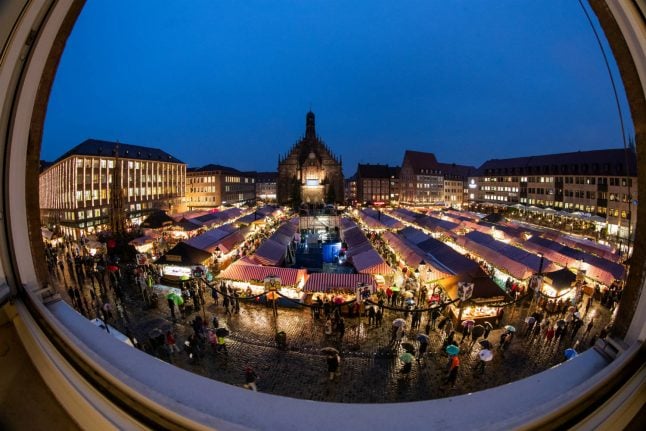The worsening pandemic has already forced a slew of other German cities,
including Berlin, Düsseldorf and Cologne, to announce they are scrapping or severely curtailing their Christmas markets.
READ ALSO: Berlin's famous Gendarmenmarkt cancelled due to coronavirus concerns
“After much deliberation and in order to protect the population, we have come to the conclusion that the Christmas market will not take place this year,” Nuremberg mayor Marcus König said in a statement.
Germany is home to some 2,500 Christmas markets each year that are popular
with visitors who come to sip mulled wine, nibble on roasted chestnuts and
shop for seasonal trinkets among clusters of wooden chalets.
They draw about 160 million domestic and international visitors annually who bring in revenues of €3 to €5 billion, according to the BSM stallkeepers' industry association.
Nuremberg's “Christkindlesmarkt”, famous for its “Christkind” Christmas
gift bringer dressed in a golden crown and robes, attracts more than two
million visitors annually.
READ ALSO: Quiz: How well do you know these festive German traditions?
It is also one of Germany's biggest and oldest such markets.
Germany has seen a surge in Covid-19 cases over the past week and has
regularly reported more than 10,000 new cases a day.
With regional disagreements hampering efforts to fight the virus, Chancellor Angela Merkel will meet the heads of Germany's 16 states on Wednesday in a bid to agree new national measures.
Merkel made a renewed plea on Saturday on citizens to limit their contacts
and avoid unnecessary travel to prevent further transmission of the virus.
“How the winter will go, how our Christmas will be, all that will be decided in the coming days and weeks,” she said.
She acknowledged that the curbs are “not only difficult but also a painful
sacrifice”.
“But we must do it only temporarily, and we're doing it for ourselves: for
our own health and that of everyone we can spare from falling ill.”
The country has recorded 437,866 cases and 10,056 deaths so far, according
to the Robert Koch Institute disease control centre.



 Please whitelist us to continue reading.
Please whitelist us to continue reading.
What’s going to be the impact on Nuernbergers with this cancellation? My guess is that it’s several hundred million euros to the local economy. Businesses go bankrupt. People struggle for years due to lost income. Maybe the Christkindlmarkt is not the same for years (or ever). And this is just one tiny example. It’s very easy to believe that the cure is literally much worse than the disease.